Posts for Tag: words
ScrabWordle
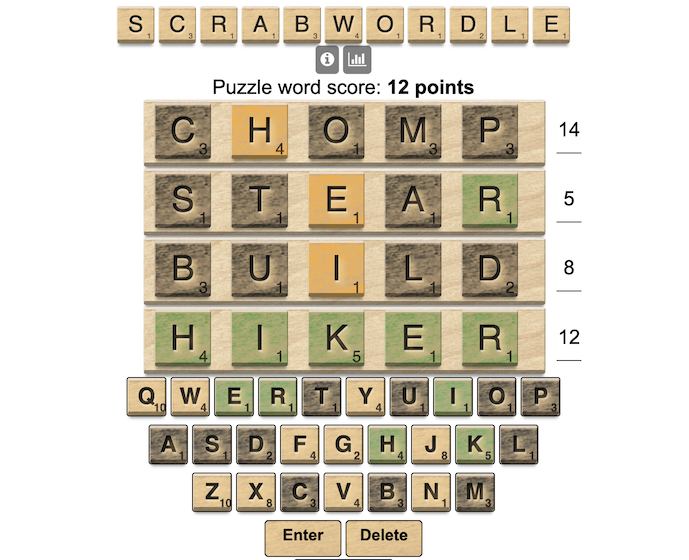
Also try WordGuessr and Tridle
What is ScrabWordle? Wordle with a Scrabble twist
ScrabWordle is a game based on the hugely popular Wordle by Josh Wardle, where you try to solve a 5-letter puzzle. The Scrabble element of the game comes in where the point value of the target word is given based on the letter values in the game and is another helpful clue to help solve the puzzle.
I recently made WordGuessr and Tridle. So I’d already made the structure of the game and just needed to add the Scrabble elements. And it took me a little while to work out all the kinks and it also improved my CSS skills to get all the aspects of the look of the tiles correct.
How to Play ScrabWordle
If you know how to play Wordle, then the rules are the same:
1) the game reports the point value of the target word
2) just type in a guess and and press ‘Enter’, the score of your guess is updated in real time
3) the game will indicate how good your guess was. If any letter are in their correct position they will turn green, if they are correct but in the wrong place, they turn orange, and if they don’t show up in the word they turn black.
4) guess again, using the clues from the previous word
5) you can share your results with other folks or issue a challenge game
6) play all you want
The game is created using HTML, CSS and Javascript code to create interactivity and UI. Hope you enjoy it. I enjoy the extra element (word point values) to help me guess the word. Let me know in the comments how you like the new game play and if the difficulty levels are appropriate.
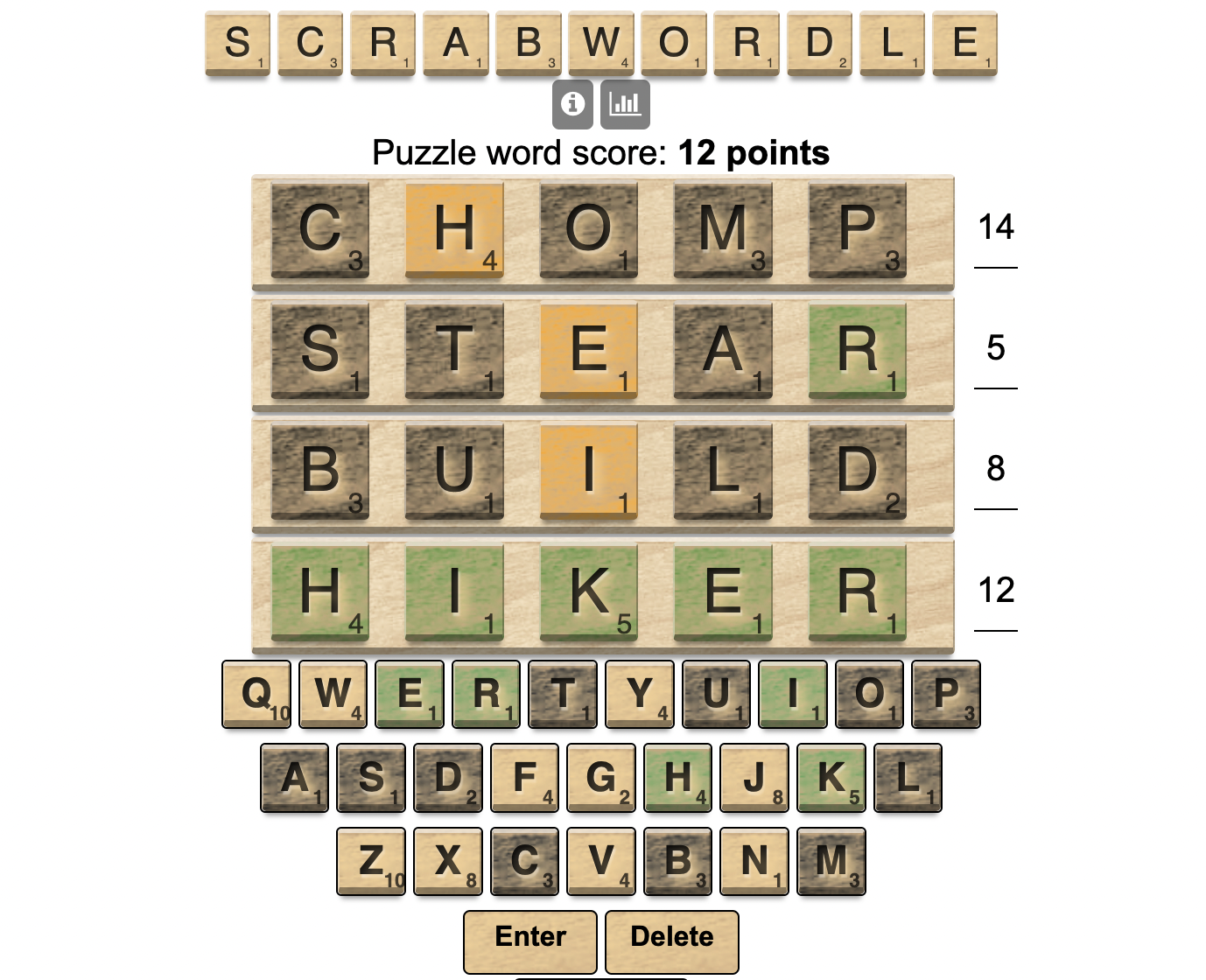
WordGuessr – a social Wordle unlimited clone – Word Guesser
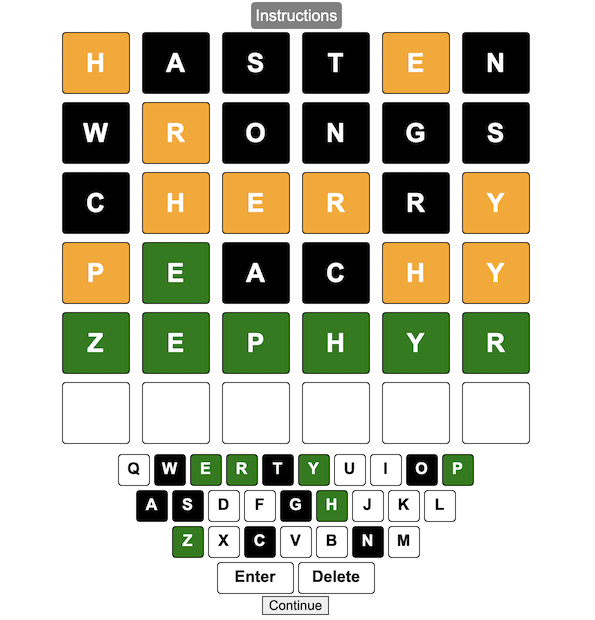
Over 16 Million games played! (Feb 2023).
Try playing my NYTimes Digits math game clone,
TRIDLE – Three Wordle Puzzles simultaneously and

Wordguessr – Unlimited endless Wordle practice
You can do your Wordle practice training here with unlimited attempts.
As my wife likes to say, “Practice makes ‘Pretty Good'”.
I made this Wordle clone in about a day after playing with Wordle for a few days. My wife and I were pretty hooked and I wanted to play more than once a day. It’s like a word version of Mastermind. I also thought it would be fun with words of different lengths, so I added the option for words between 3-7 letters long. Depending on the number of letters, the game feels very different. 3 letters is very short and it’s easier in some respects but you have to guess more. Longer words require much more thinking.
The rules of the game are pretty simple:
1) just type in a guess and and press ‘Enter’.
2) the game will indicate how good your guess was. If any letter are in their correct position they will turn green, if they are correct but in the wrong place, they turn orange, and if they don’t show up in the word they turn black.
3) guess again, using the clues from the previous word
4) repeat until you get the word correct or fail to figure it out after 6 tries.
I added the ability to create a challenge game that allows you to share a link (with a unique code) which will enable anyone with the link to play the same word.
Apparently, my site is unblocked on education websites (which makes sense since it has a lot of educational content), so I seem to be getting lots of traffic from Chromebooks searching for “Wordle Unblocked”.
You can also share your guessing results (not the answer) with a grid of boxes, like the original Wordle, as shown below:
WordGuessr Challenge
(5 letter) 4/6
🟩⬛⬛⬛🟧
🟩🟧🟧⬛⬛
🟩🟩🟩⬛🟧
🟩🟩🟩🟩🟩
Try the same exact puzzle here:
https://engaging-data.com/wordguessr-wordle/?challenge=uab5
I also added the game stats which should persist across games and lets you look at stats for games of different word lengths individually as well as all your games.
I wasn’t sure what how the original Wordle game handles duplicate letters so I made up my own set of rules for how it would happen. First, if there are multiple instances of a single letter (e.g. two ‘E’s in a word) and you make a guess of a word with two ‘E’. If one is in the correct spot and one is in the wrong spot, one will be green and the other orange. If both are in the wrong spot, they will both be orange. If there is only one ‘E’ in the answer but you guess two, one will be black and the other will be green or orange depending on its position.
Sources and Tools:
Obviously a big shout out to Josh Wardle and his Wordle game, as this is mostly a carbon copy of his game with a few additions.
I downloaded the most common words in English from the English Lexicon Project Web Site at Washington University in St. Louis. Then I processed these to remove foreign language words and other strange entries and split them into groups of words by number of letters using Python.
The game is created using HTML, CSS and Javascript code to create interactivity and UI. Thanks to my wife and daughter for beta-testing, lots of fun beta testing.

Visualizing the accuracy of the “i before e, except after c” spelling rule
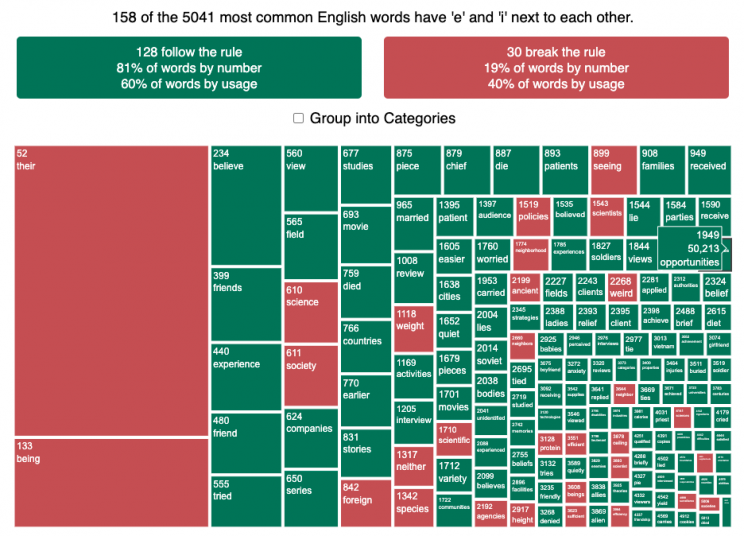
See which words follow and break the “i before e” rule
I wanted to see how often there were exceptions to the spelling rule “i before e, except after c”. I found a website (wordfrequency.info) that had a list of the 5050 most common english words and decided to do some analysis on it to see which words followed this rule and which did not. Below is a treemap graph that shows the words that follow the rule in green and those that do not in red. The size of the box represents how common the word is in regular American English usage (based on the frequency that it shows up in the Corpus of Contemporary American English).
What we see is that while 81% of the 158 most common words with ‘e’ and ‘i’ adjacent to one another do follow the rule, when you take into account how frequently these words are used, the weighted percentage of words following the rule drops to around 60%. This is because some very commonly used words do not follow this rule and if you were to count how many times you use words from this list, it’s likely that about 40% of the time you’ll be using words that don’t follow the rule. For example, the two most commonly used words with ‘e’ and ‘i’ adjacent (their and being) do not follow the rule, since then have the ‘e’ before the ‘i’ but aren’t after a ‘c’.
I was inspired to look into this after seeing a tweet about the rule in the comic Pearls before Swine by @stephanpastis.
Perhaps the most unhelpful spelling rule ever. pic.twitter.com/sW0aud6rA3
— Stephan Pastis (@stephanpastis) March 9, 2021
I asked my kids but they had never heard of the rule so perhaps this isn’t taught in schools anymore.
Sources and Tools:
I downloaded the word list from wordfrequency.info. The wordlist comes from the Corpus of Contemporary American English (COCA), a collection of English works across a wide variety of genres (spoken, fiction, popular magazines, newspapers, academic texts, and TV and Movies subtitles, blogs, and other web pages between 1990 and 2020). This word list was then analyzed using javascript to categorize the word as fitting or breaking the rule. The visualization uses the plotly.js open source graphing library and HTML/CSS/Javascript code for the interactivity and UI.
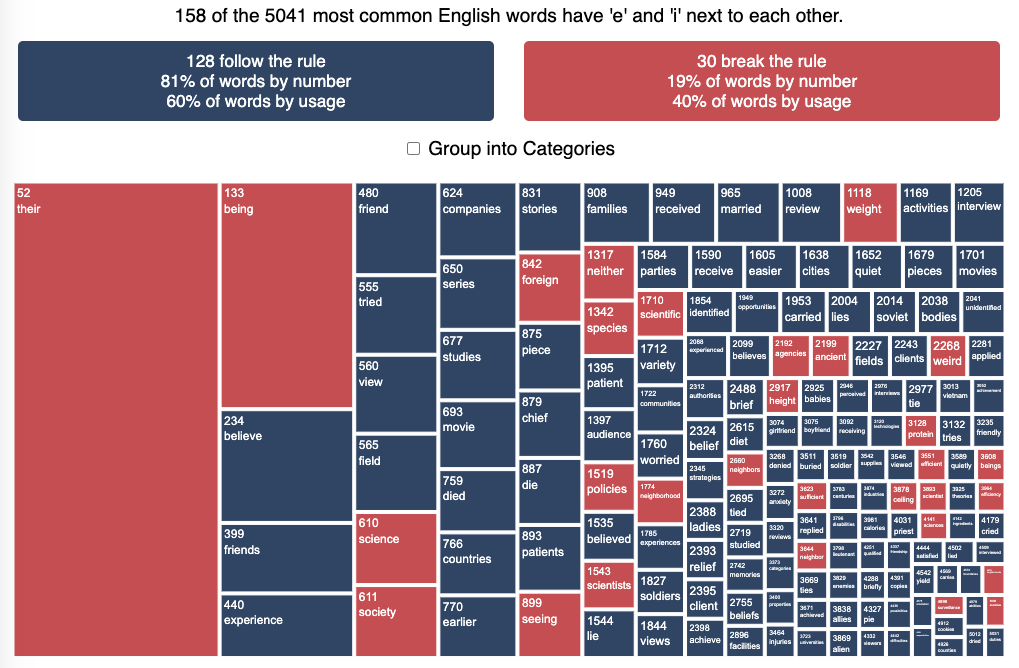
ScrabWordle

Also try WordGuessr and Tridle
What is ScrabWordle? Wordle with a Scrabble twist
ScrabWordle is a game based on the hugely popular Wordle by Josh Wardle, where you try to solve a 5-letter puzzle. The Scrabble element of the game comes in where the point value of the target word is given based on the letter values in the game and is another helpful clue to help solve the puzzle.
I recently made WordGuessr and Tridle. So I’d already made the structure of the game and just needed to add the Scrabble elements. And it took me a little while to work out all the kinks and it also improved my CSS skills to get all the aspects of the look of the tiles correct.
How to Play ScrabWordle
If you know how to play Wordle, then the rules are the same:
1) the game reports the point value of the target word
2) just type in a guess and and press ‘Enter’, the score of your guess is updated in real time
3) the game will indicate how good your guess was. If any letter are in their correct position they will turn green, if they are correct but in the wrong place, they turn orange, and if they don’t show up in the word they turn black.
4) guess again, using the clues from the previous word
5) you can share your results with other folks or issue a challenge game
6) play all you want
The game is created using HTML, CSS and Javascript code to create interactivity and UI. Hope you enjoy it. I enjoy the extra element (word point values) to help me guess the word. Let me know in the comments how you like the new game play and if the difficulty levels are appropriate.

WordGuessr – a social Wordle unlimited clone – Word Guesser

Over 16 Million games played! (Feb 2023).
Try playing my NYTimes Digits math game clone,
TRIDLE – Three Wordle Puzzles simultaneously and

Wordguessr – Unlimited endless Wordle practice
You can do your Wordle practice training here with unlimited attempts.
As my wife likes to say, “Practice makes ‘Pretty Good'”.
I made this Wordle clone in about a day after playing with Wordle for a few days. My wife and I were pretty hooked and I wanted to play more than once a day. It’s like a word version of Mastermind. I also thought it would be fun with words of different lengths, so I added the option for words between 3-7 letters long. Depending on the number of letters, the game feels very different. 3 letters is very short and it’s easier in some respects but you have to guess more. Longer words require much more thinking.
The rules of the game are pretty simple:
1) just type in a guess and and press ‘Enter’.
2) the game will indicate how good your guess was. If any letter are in their correct position they will turn green, if they are correct but in the wrong place, they turn orange, and if they don’t show up in the word they turn black.
3) guess again, using the clues from the previous word
4) repeat until you get the word correct or fail to figure it out after 6 tries.
I added the ability to create a challenge game that allows you to share a link (with a unique code) which will enable anyone with the link to play the same word.
Apparently, my site is unblocked on education websites (which makes sense since it has a lot of educational content), so I seem to be getting lots of traffic from Chromebooks searching for “Wordle Unblocked”.
You can also share your guessing results (not the answer) with a grid of boxes, like the original Wordle, as shown below:
WordGuessr Challenge
(5 letter) 4/6
🟩⬛⬛⬛🟧
🟩🟧🟧⬛⬛
🟩🟩🟩⬛🟧
🟩🟩🟩🟩🟩
Try the same exact puzzle here:
https://engaging-data.com/wordguessr-wordle/?challenge=uab5
I also added the game stats which should persist across games and lets you look at stats for games of different word lengths individually as well as all your games.
I wasn’t sure what how the original Wordle game handles duplicate letters so I made up my own set of rules for how it would happen. First, if there are multiple instances of a single letter (e.g. two ‘E’s in a word) and you make a guess of a word with two ‘E’. If one is in the correct spot and one is in the wrong spot, one will be green and the other orange. If both are in the wrong spot, they will both be orange. If there is only one ‘E’ in the answer but you guess two, one will be black and the other will be green or orange depending on its position.
Sources and Tools:
Obviously a big shout out to Josh Wardle and his Wordle game, as this is mostly a carbon copy of his game with a few additions.
I downloaded the most common words in English from the English Lexicon Project Web Site at Washington University in St. Louis. Then I processed these to remove foreign language words and other strange entries and split them into groups of words by number of letters using Python.
The game is created using HTML, CSS and Javascript code to create interactivity and UI. Thanks to my wife and daughter for beta-testing, lots of fun beta testing.

Visualizing the accuracy of the “i before e, except after c” spelling rule

See which words follow and break the “i before e” rule
I wanted to see how often there were exceptions to the spelling rule “i before e, except after c”. I found a website (wordfrequency.info) that had a list of the 5050 most common english words and decided to do some analysis on it to see which words followed this rule and which did not. Below is a treemap graph that shows the words that follow the rule in green and those that do not in red. The size of the box represents how common the word is in regular American English usage (based on the frequency that it shows up in the Corpus of Contemporary American English).
What we see is that while 81% of the 158 most common words with ‘e’ and ‘i’ adjacent to one another do follow the rule, when you take into account how frequently these words are used, the weighted percentage of words following the rule drops to around 60%. This is because some very commonly used words do not follow this rule and if you were to count how many times you use words from this list, it’s likely that about 40% of the time you’ll be using words that don’t follow the rule. For example, the two most commonly used words with ‘e’ and ‘i’ adjacent (their and being) do not follow the rule, since then have the ‘e’ before the ‘i’ but aren’t after a ‘c’.
I was inspired to look into this after seeing a tweet about the rule in the comic Pearls before Swine by @stephanpastis.
Perhaps the most unhelpful spelling rule ever. pic.twitter.com/sW0aud6rA3
— Stephan Pastis (@stephanpastis) March 9, 2021
I asked my kids but they had never heard of the rule so perhaps this isn’t taught in schools anymore.
Sources and Tools:
I downloaded the word list from wordfrequency.info. The wordlist comes from the Corpus of Contemporary American English (COCA), a collection of English works across a wide variety of genres (spoken, fiction, popular magazines, newspapers, academic texts, and TV and Movies subtitles, blogs, and other web pages between 1990 and 2020). This word list was then analyzed using javascript to categorize the word as fitting or breaking the rule. The visualization uses the plotly.js open source graphing library and HTML/CSS/Javascript code for the interactivity and UI.

Recent Comments